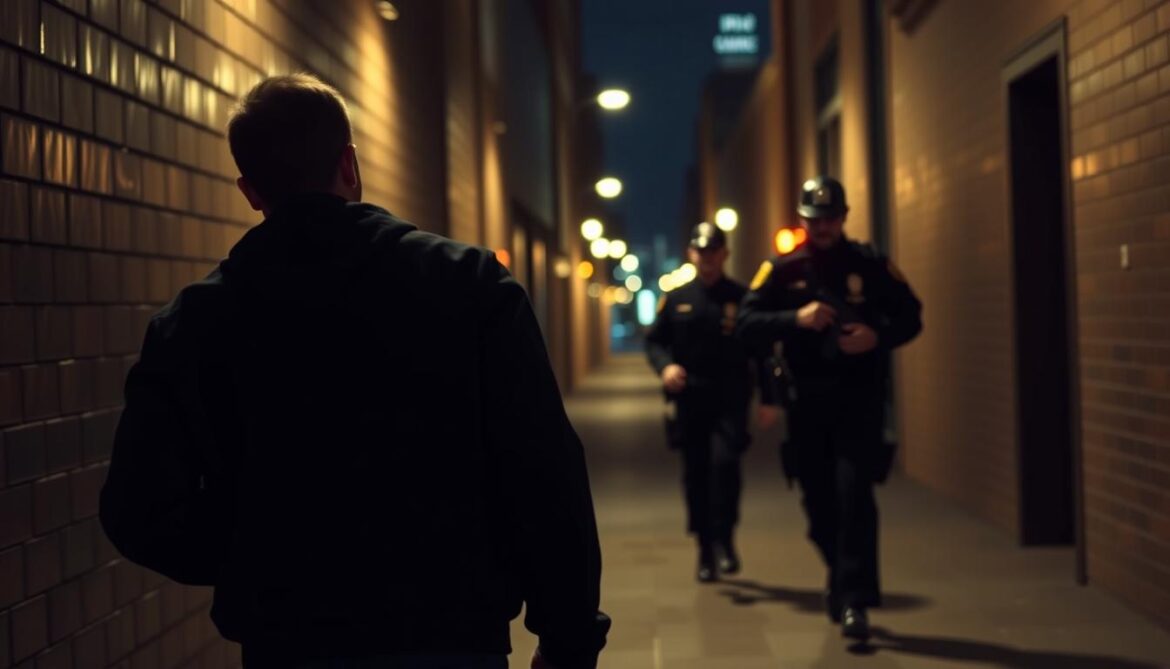Did you know many police chases start because people run from traffic stops? This often leads to big legal problems. Learning how to interact with cops is key. We’ll give you tips to not run from police and advice on dealing with them legally.
When a peace officer comes up to you, staying calm and following orders is important. Getting scared or acting quickly can bring serious charges. By knowing these tips, you can deal with police smoothly and keep things legal.
Understanding the Legal Consequences of Flight from Peace Officer
Fleeing a peace officer is a major crime in Canada, as stated in Section 320.17 of the Criminal Code. Drivers must stop their vehicle when asked by a peace officer. Not stopping can lead to serious legal issues.
Definitions and Legal Framework
The Canada Crime Code makes it clear that running from a peace officer is illegal. This happens when someone in a car tries to escape from a peace officer on purpose. The rule helps keep respect for police and keeps everyone safe.
Potential Criminal Code Penalties
The penalties for fleeing vary but are always serious. This act can be seen as a hybrid offense. It could lead to up to 10 years in jail for serious cases. Less severe cases still have tough consequences.
Aggravating Factors to Be Aware Of
Some things can make the penalties for fleeing worse. This includes if there were people walking nearby, bad road conditions, or if the driver was being very risky. These factors make the situation more serious and can lead to stricter punishment. They show why it’s so important to follow road rules and listen to police.
Importance of Staying Calm During Police Encounters
It’s very important to stay calm when you meet with police. Keeping your cool helps keep everyone safe. It also avoids problems and makes the meeting with the officers go smoothly.
Tips to Manage Your Emotions
Here are some useful tips to stay calm during police encounters:
- Take Deep Breaths: Deep breathing lowers your stress and helps you stay calm.
- Keep Your Hands Visible: Showing your hands helps officers feel safe and prevents misunderstandings.
- Speak Politely and Clearly: A calm and respectful voice can reduce tension.
- Avoid Sudden Movements: Quick or unplanned movements can be seen as a threat. So, move slowly.
Why Calmness Helps Avoid Escalation
Being calm is good for you and the police. Here’s why:
- Reduces Miscommunication: Calmness leads to better communication, lowering the chance of mistakes.
- Minimizes Aggression: Staying calm can keep things from getting worse.
- Improves Decision-Making: You think clearer and follow instructions better when you’re calm. This can make things go better.
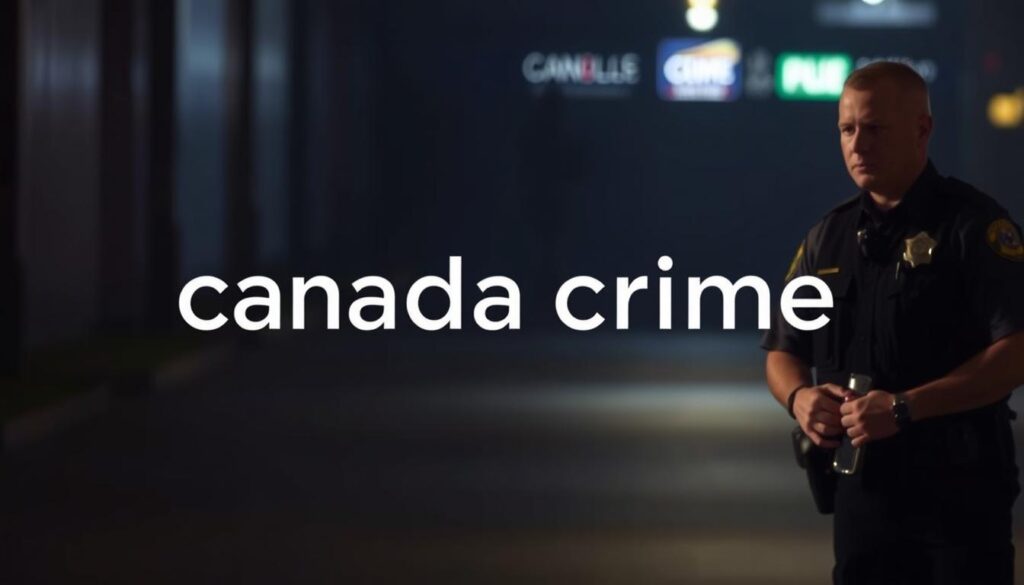
Managing your emotions when you’re stopped by the police is very important. If you stay calm, you’re more likely to resolve things peacefully. And, you’re less likely to face any legal problems.
Know Your Rights and Obligations
Knowing what to do if the police stop you is key for Canadians. It helps make sure everything goes smoothly and legally. Understanding your rights and duties stops problems and legal issues from coming up.
Basic Rights During a Police Stop
When the police stop you, it’s vital to know your rights. For starters, you don’t have to talk except to say who you are. You also have the right to a lawyer. This means if you’re arrested, you can ask to talk to a lawyer before you say anything else.
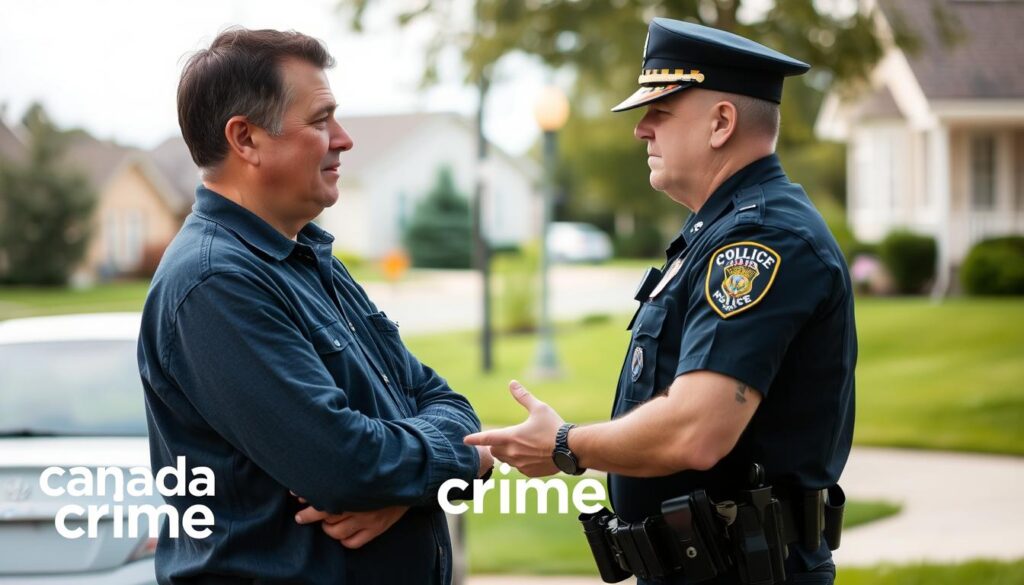
Obligations You Must Follow
You must also follow certain rules at a police stop in Canada. You have to show ID when asked, like your driver’s license if you’re driving. It’s important to stay calm and listen to lawful commands from the officers.
Knowing your rights and duties at a police stop keeps things running smoothly. It can shield you from problems. Being prepared and informed is empowering.
Effective Communication with Law Enforcement
Clear, respectful communication is vital when talking to law enforcement. Knowing what to say and how to say it can change the outcome of your interaction. It helps keep things calm and effective.
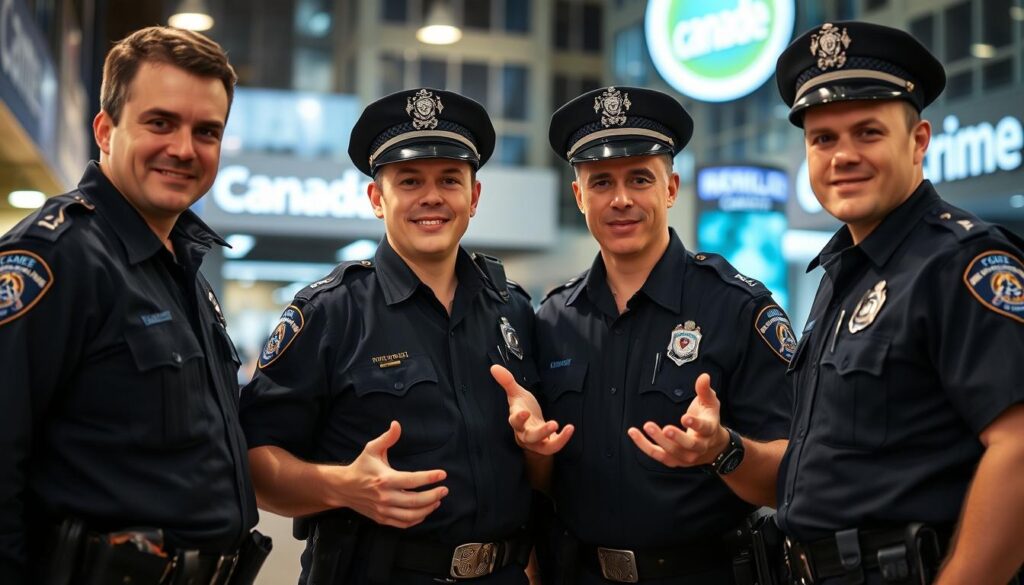
Essential Communication Tips
Be respectful and clear when talking to police. Start with a polite greeting and give any documents they ask for quickly. Always keep your hands where they can see them. Avoid sudden movements that could scare the officer.
- Listen Carefully: Follow the officer’s instructions carefully without arguing.
- Remain Calm: Stay calm and avoid using words that could cause tension.
- Be Honest: Don’t lie as it could make things worse. Being open can build trust.
What to Say and What Not to Say
What you say to police can really make a difference. Be clear and careful with your words, avoiding anything that seems like you’re dodging the question or being aggressive.
- Do Say: “I’m reaching for my license and registration” before moving your hands.
- Do Say: “Am I being detained?” or “Am I free to go?” to understand your situation.
- Do Not Say: Anything that admits guilt, like “I only had one drink,” even if it seems minor.
- Do Not Say: Anything mean or confrontational, as it can make things worse.
Good communication with police involves respect, clear words, and knowing the right things to say. These tips can make your interactions smoother. It leads to a safer and more respectful talk for everyone.
Tips to Prevent Flight from Peace Officer
It’s critical to know how to avoid fleeing from a police officer. This can lower legal problems and keep you safe. Staying aware of lawful reasons for not stopping helps you handle police interactions wisely.
Avoiding Actions that Lead to Charges
To avoid getting charged with fleeing, stay calm and work with the officer. Here are tips that help:
- Stay visible: Keep your hands where the officer can see them. Sudden movements can seem threatening.
- Communicate intentions: Tell the officer clearly if you’re going to grab your ID or get out of the car.
- Follow instructions: Always do what the officer tells you to avoid making things worse.
Legal Excuses for Failing to Stop
There are valid reasons why you might not stop for an officer. Knowing these can help your defense. These reasons matter when you’re not trying to escape but are in special situations:
| Legal Excuse | Explanation |
|---|---|
| Medical Emergency | An urgent medical need that requires immediate care can be a reason for not stopping right away. |
| Unsafe Location | If stopping could be dangerous (like in a dark, lonely place), it’s okay to keep going to a safer place. |
| Misunderstanding | A real confusion about what the officer wants may be accepted as a reason. |
Being aware of legal reasons for not stopping helps you navigate these situations better. For more on penalties and laws, check the Criminal Notebook.
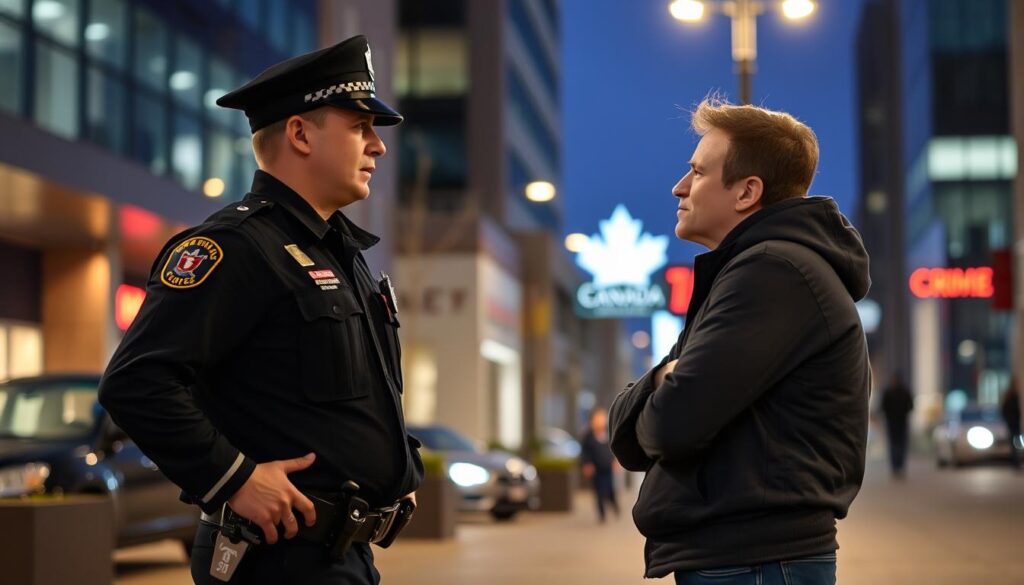
De-Escalation Strategies with Police
Interacting with law enforcement can be stressful. Understanding how to effectively calm situations with police can make things safer. This results in a better outcome for everyone.
Steps to Calmly Resolve Issues
Using the right de-escalation steps with police starts with staying calm. Below are key steps to peacefully solve problems during a police encounter:
- Remain calm and composed: Deep breaths help control emotions. This reduces the chance of making things worse.
- Listen actively: Focus on what the officer is saying. Make sure not to interrupt them.
- Respond politely: Even if you feel mistreated, speak with respect.
- Comply with instructions: Quickly doing what the officer says avoids confusion.
- Seek clarity: If you’re confused, politely ask the officer to explain or repeat.
The Role of Body Language
Body language plays a big role during police interactions. Here’s what to keep in mind:
- Non-threatening posture: Keep hands where they can be seen and avoid sudden moves.
- Maintain eye contact: This shows you are paying attention and respectful. Yet, respect cultural views on eye contact.
- Open body language: An open stance shows honesty and reduces threat.
- Neutral facial expressions: Avoid showing anger or aggression with your face.
With the right body language, people can show they’re following the rules and respect the police. De-escalation strategies with police build trust. For more on hate crime trends and how to prevent them, click here.
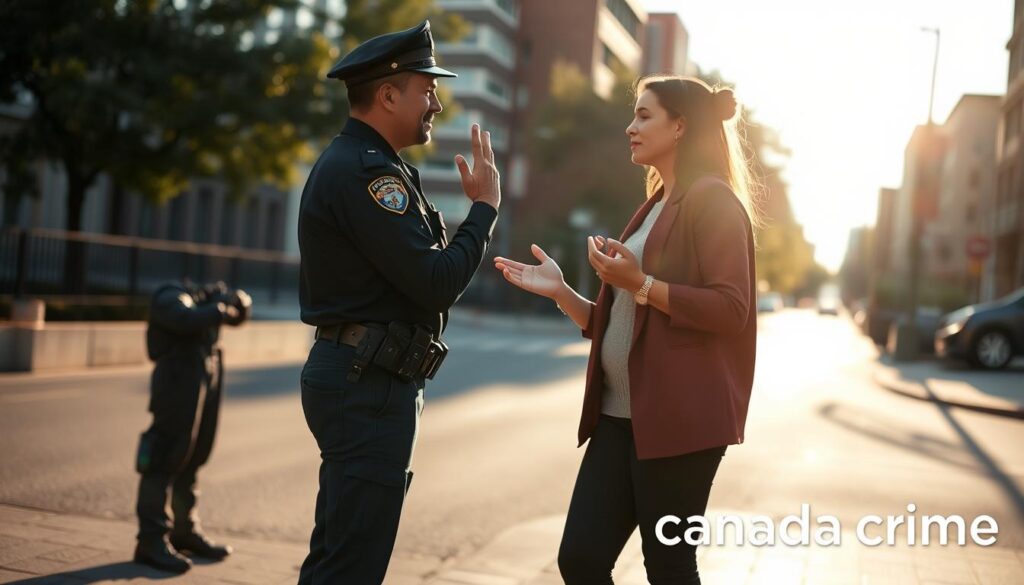
Common Mistakes to Avoid During Traffic Stops
Getting stopped by the police can make your heart race. Yet, knowing what mistakes to dodge can keep things calm. It’s important to stay cool and speak clearly so things don’t get worse.
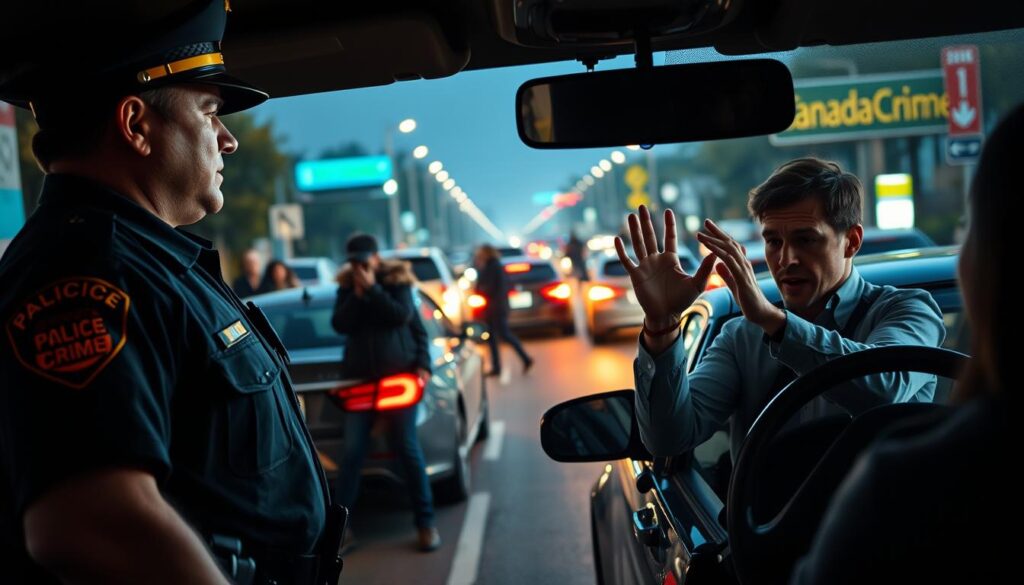
Actions that Can Escalate Situations
Certain moves can make a traffic stop tenser. Sudden reaches into the glove box or under the seat can scare officers. Arguing does the same. It’s key to keep still and listen well.
Staying away from these errors makes things safer for all. Keeping calm and following what the officer says helps a lot.
Legal Consequences of Running from Police
Trying to escape an officer raises the risk and can lead to big trouble. In Canada, running away can mean criminal charges, big fines, or even jail time. The penalty’s size can change if someone gets hurt or if you’re driving dangerously.
Thinking about these consequences should make you think twice:
| Action | Possible Consequences |
|---|---|
| Sudden Movements | Increased Tension |
| Arguing with Officer | Situation Escalation |
| Fleeing from Police | Criminal Charges, Fines, Imprisonment |
Realizing how bad fleeing from police can be should stop anyone from trying it. Working with police during traffic stops makes things safer and smoother.
Understanding the Section 320.17 Criminal Code
It’s vital to know about the Section 320.17 Criminal Code to deal with police pursuits in Canada. This knowledge helps in understanding the legal outcomes you might face.
Definition and Important Details
Section 320.17 gives clear legal definitions and the consequences of dodging the police. It explains how serious it is to evade law enforcement. Plus, it mentions the penalties and outcomes of not following police orders during a chase.
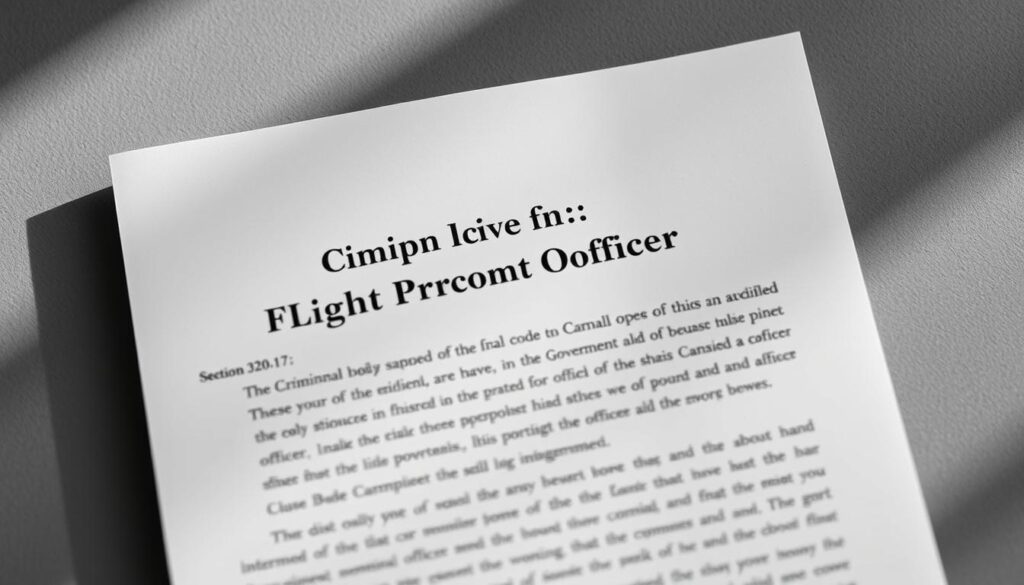
How It Applies During Police Pursuits
The Section 320.17 Criminal Code is key for legal details on police chases. Fleeing from police can result in serious charges. It’s to stop people from starting dangerous high-speed chases.
Key points cover the chase’s nature, when force is used, and risks to public safety. Knowing this section changes how legal views and handles police pursuits.
Additional Measures to Stay Compliant with Law Enforcement
Interacting with law enforcement involves both the driver and passengers. Everyone has a part in how a police stop unfolds. Knowing how to document these encounters and the right way for passengers to act is key. This knowledge helps make the experience smoother and keeps things legal.
Documenting Police Encounters
Keeping a record of police interactions is crucial. You can use your phone to record or write notes about what happened. It’s usually legal to record officers as long as you don’t get in their way. Such records are useful if there’s a dispute later. They help keep everyone accountable.
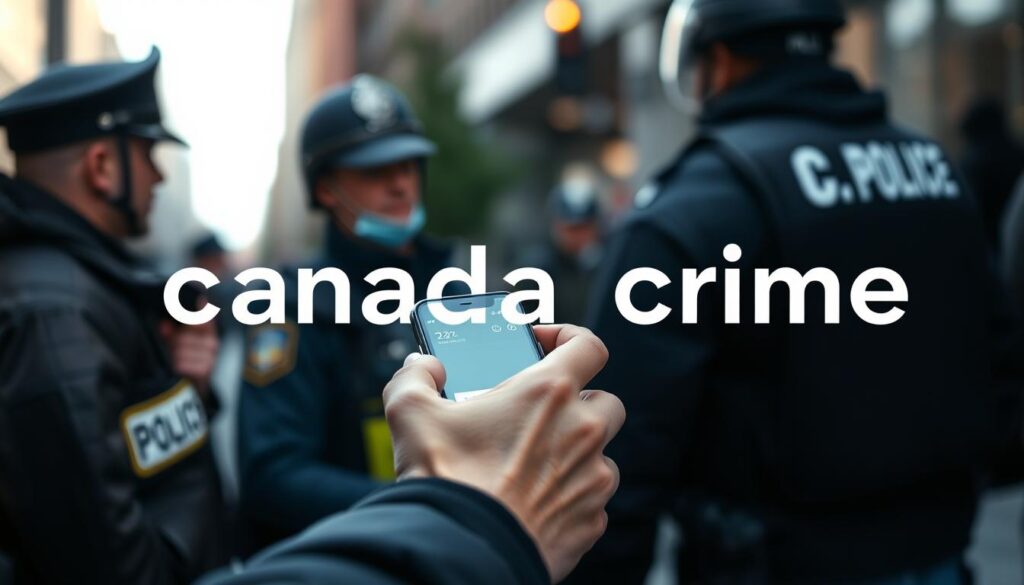
Role of Passengers During Stops
What passengers do during stops matters a lot. Staying calm, keeping hands in sight, and not making sudden moves is important. Passengers should speak only when needed and follow the officer’s directions. Telling the officer before reaching for anything can prevent misunderstandings. These actions can reduce tension and make the stop go smoothly.
Knowing how to document interactions and how passengers should behave are key to staying right with the law. Following these tips helps everyone stay safe and shows respect during police stops.
Conclusion
To avoid trouble when meeting with police, stay calm and informed. We talked about not running away, knowing your rights, and how to talk to officers. These tips can help you avoid making things worse and getting into legal problems.
It’s also important to control your emotions and use strategies to keep the peace. How you act and look matters a lot during these moments. We also pointed out what not to do when stopped by the police and gave legal tips to help you follow the rules and avoid getting in trouble.
In the end, knowing what to do and being ready are your best tools when dealing with the police. If you follow the right steps and use your rights the right way, you’ll feel more confident. Always remember that working together and knowing the law are key in making any police interaction safer and more legal.

